Resources
This carefully curated collection of resources will help you find packages and learning resources to help you on your R journey.
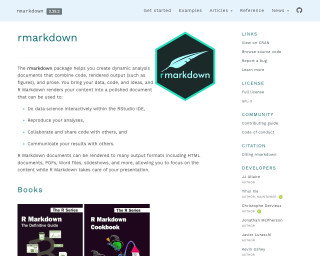
RMarkdown
The rmarkdown package helps you create dynamic analysis documents that combine code, rendered output (such as figures), and prose. It allows you to do data science interactively within the RStudio IDE, reproduce your analyses, collaborate and share code with others, and communicate your results with others. R Markdown documents can be rendered to many output formats including HTML documents, PDFs, Word files, slideshows, and more.
Go to Resource
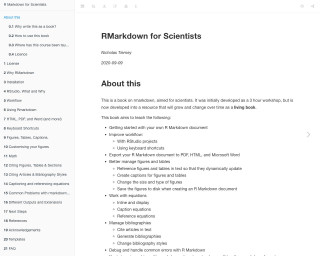
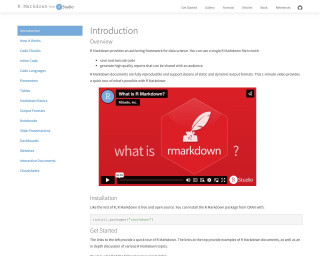
RMarkdown Tutorials
R Markdown provides an authoring framework for data science. It allows users to save and execute code, generate high-quality reports, and share them with an audience. R Markdown documents are fully reproducible and support various static and dynamic output formats. The R Markdown package is free and open source and can be installed from CRAN. The R Markdown website provides comprehensive documentation and resources for getting started with R Markdown.
Go to Resource
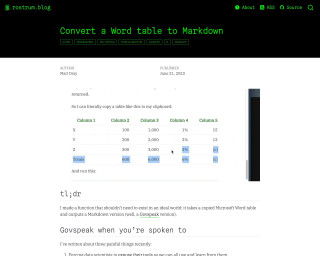

Rotate the damn plot
Ilya Kashnitsky criticizes common academic data visualization errors, advocating for simple improvements in graph readability. He suggests using dotplots over multi-category bar/column plots, recommending the placement of continuous variables on the x-axis and categorical variables on the y-axis. Kashnitsky outlines the method to digitize the data from a plot image using WebPlotDigitizer, and expresses disappointment in mainstream Large Language Models' (LLMs) failure to automate this task accurately. He also promises to document additional dataviz principles and to enhance educational content through his BlueSky social media account.
Go to Resource
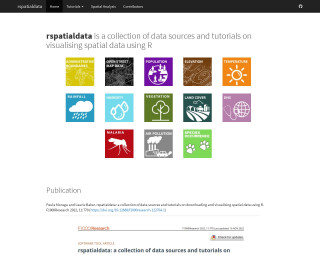
rspatialdata
rspatialdata is an online resource featuring a compilation of data sources and tutorials aimed at helping users download and visualize spatial data using R. The platform is maintained by Paula Moraga and Laurie Baker and includes topics like administrative boundaries, Open Street Map data, population, climate variables (e.g., elevation, temperature, rainfall, humidity), vegetation, land cover, and health and environmental data (DHS, Malaria, Air Pollution, Species Occurrence). It's an open learning material with updates and community contributions, ideal for researchers and students in spatial analysis.
Go to Resource

rspatialdata
rspatialdata is an online resource featuring a compilation of data sources and tutorials aimed at helping users download and visualize spatial data using R. The platform is maintained by Paula Moraga and Laurie Baker and includes topics like administrative boundaries, Open Street Map data, population, climate variables (e.g., elevation, temperature, rainfall, humidity), vegetation, land cover, and health and environmental data (DHS, Malaria, Air Pollution, Species Occurrence). It's an open learning material with updates and community contributions, ideal for researchers and students in spatial analysis.
Go to Resource
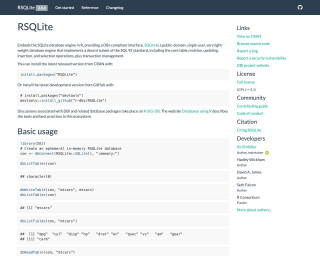
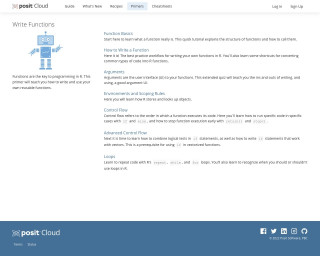
RStudio Cloud Primer: Functions
Posit Cloud is a cloud-based platform for managing and analyzing data in the financial services industry.
Go to Resource
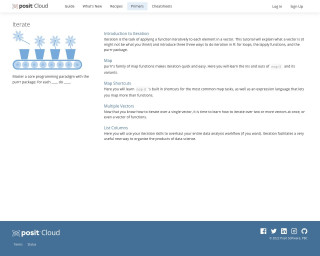
RStudio Cloud Primer: Iterate
Posit Cloud is a cloud platform that provides storage and computing resources for businesses and developers in order to store, process, and analyze large amounts of data.
Go to Resource
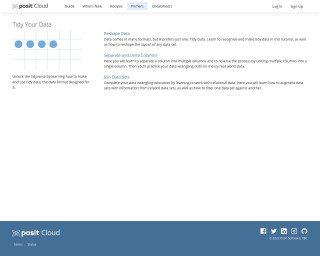
RStudio Cloud Primer: Tidy Your Data
Posit Cloud is a cloud-based platform that provides data storage and analysis tools for the R programming language.
Go to Resource
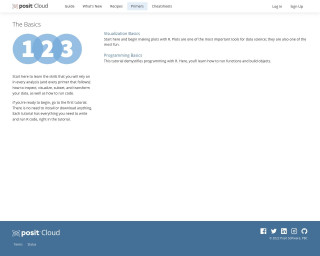
RStudio Cloud Primer: Visualize Your Data
Posit Cloud is a cloud-based platform for storing and managing business data.
Go to Resource